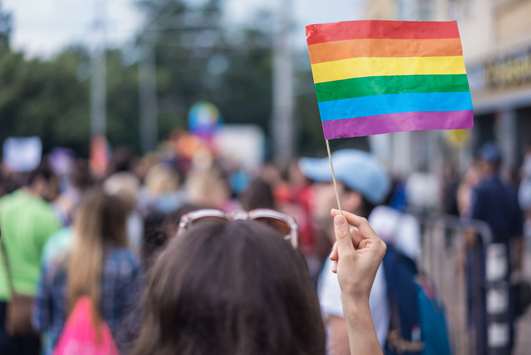Authors: Dr. phil., Dipl.-Psych. Jochen Kramer
LGBTQI* in different Countries and Religions
LGBTQI* persons have always existed and are present to more or less the same extent in all countries around the world. The fact that they were not so visible in the past, or even still today in some countries, can be attributed to the repression that LGBTQI* persons have experienced or continue to experience. In principal, being LGBTQI* does not necessarily contradict religious beliefs; most major world religions also feature more liberal interpretations of religious writings or rules. In many regions and religions around the world, the rejection of LGBTQI* persons was first “exported” from Europe in the time of colonization (source: AI2013 on Homosexuality).
The Meaning of Cultural Traditions
In some families or societal groups, being LGBTQI* is viewed as incompatible with their traditions. In this way, religious and ethnic traditions make it difficult for LGBTQI* persons to live their lives the way they would like. Religious and ethnic traditions can however also be an important source of strength. Whether ethnic and religious traditions and values have an empowering or debilitating effect depends (according to Kizilhan…) on whether the following factors in the family or community of the individual apply:
- Religious or ethnic traditions are lived openly and supportively (= source of strength) or in a more strict manner affecting daily life (= obstacle)
- Integration into the social environment is good (= source of strength) or not good (= obstacle).
- All members are granted the same rights (including all genders), the wellbeing of each member takes center stage and violence is rejected as a means of education (= source of strength), or a strongly hierarchical patriarchal structure reigns, there is a strong concept of honor, sexuality is controlled and violence is used as a means of education (= obstacle).
How these traditions are lived in reality is therefore crucial. It depends whether these traditions turn out to be resources or hazards. It does not depend on which religion or ethnic group one belongs to.
When traditions in their own environment are lived in such a way that they endanger the wellbeing of LGBTQI* persons,
- It is all the more difficult to be clear with yourself as to how to live your life in a such a way that you can be true to your sexual orientation and gender identity in a way that fits in with your beliefs and ethnicity (inner coming out)
- It is all the more difficult to openly show yourself to others as you are (external coming out)
- It is therefore all the more important to get support from people who are culturally sensitive and supportive of LGTBQI* persons. This can also be an important criterion when seeking psychological support.
Further links for persons with LGBTQI* and migration backgrounds
People coming from migrant backgrounds who grapple with the question as to whether they identify as having a homo, bi or transgender identity often face particular challenges arising from the relationship or interplay between their sexual orientation and their cultural background.
In 2010 on behalf of the LSVD, Prof. Dr. phil. Melanie Steffen published the first study on the living situation of gay and lesbian persons with migrant backgrounds. The findings of the study, as well as a summary of them, can be found on the website www.migrationsfamilien.de.
The LSVD has created an online methodological manualfor educational activities with migrant families on the subject of homosexuality. This can be found on the same website as above.
Furthermore, donna clara, a psychosocial counselling centre for women, has released a flyer on lesbian life and migration in Schleswig-Holstein<INSERT LINK>.
In our project “Arrive Differently – Understanding Diversity” ("Anders ankommen – Vielfalt verstehen") we engage with the situation of LGTBQI* persons who have fled their home country. In this project we have developed some handouts for language mediation that can be downloaded in the downloads section of the website.
Last updated: 03/31/2023 - 15:23


